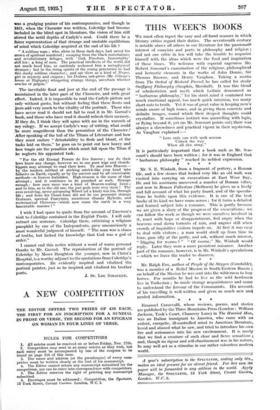THIS WEEK'S BOOKS
WE must often regret the easy and off-hand manner in which literary critics regard their duties. The seventeenth century is notable above all others in our literature for the passionate interest of essayists and poets in philosophy and religion ; and not one critic in ten will take the trouble to acquaint himself with the ideas which were the food and inspiration of those times. We welcome with especial eagerness Mr. Robert Sencourt's examination of the religious, philosophical and hermetic elements in the works of John Donne, Sir Thomas Browne, and Henry Vaughan. Taking a motto from The Ordeal of Richard Feverel, he has called his study Outflying Philosophy (Simpkin, Marshall). It was this blend of scholasticism and myth which Leibniz denounced as
barbarous philosophy," for his strict mind it contained too much emotional appeal, too much quick intuition, too many short cuts to truth. Yet it was of great value in keeping men's minds aware of high issues, and in giving them concrete and definite images, round which their deepest thoughts could crystallize. If sometimes instinct was quarrelling with logic, or flying beyond it, yet (as Mr. Sencourt points out) there was always a shrewdness and practical vigour in their mysticism. As Vaughan explained :—
" Love only can with quik access° Unlock the way When all else stray."
It is particularly important that a book such as Mr. Sen- court's should have been written ; for it was in England that " barbarous philosophy " reached its noblest expression.


































 Previous page
Previous page